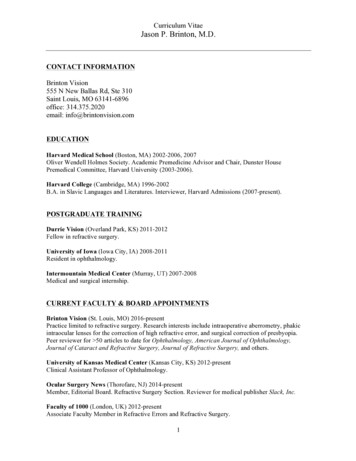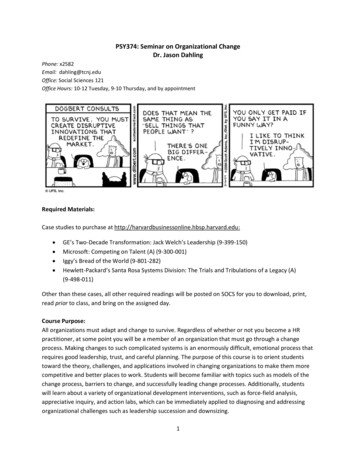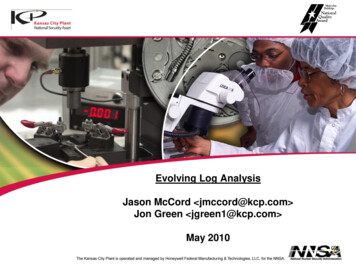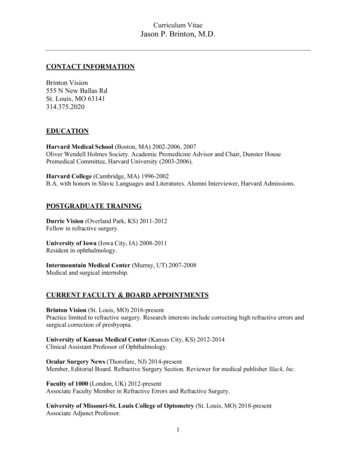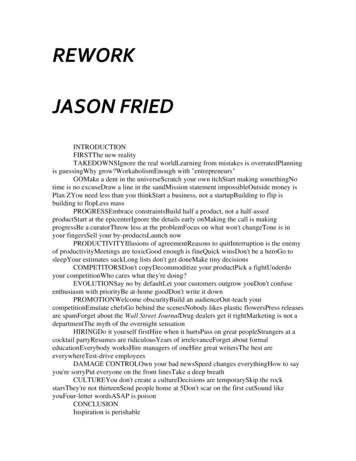
Transcription
REWORKJASON FRIEDINTRODUCTIONFIRSTThe new realityTAKEDOWNSIgnore the real worldLearning from mistakes is overratedPlanningis guessingWhy grow?WorkaholismEnough with "entrepreneurs"GOMake a dent in the universeScratch your own itchStart making somethingNotime is no excuseDraw a line in the sandMission statement impossibleOutside money isPlan ZYou need less than you thinkStart a business, not a startupBuilding to flip isbuilding to flopLess massPROGRESSEmbrace constraintsBuild half a product, not a half-assedproductStart at the epicenterIgnore the details early onMaking the call is makingprogressBe a curatorThrow less at the problemFocus on what won't changeTone is inyour fingersSell your by-productsLaunch nowPRODUCTIVITYIllusions of agreementReasons to quitInterruption is the enemyof productivityMeetings are toxicGood enough is fineQuick winsDon't be a heroGo tosleepYour estimates suckLong lists don't get doneMake tiny decisionsCOMPETITORSDon't copyDecommoditize your productPick a fightUnderdoyour competitionWho cares what they're doing?EVOLUTIONSay no by defaultLet your customers outgrow youDon't confuseenthusiasm with priorityBe at-home goodDon't write it downPROMOTIONWelcome obscurityBuild an audienceOut-teach yourcompetitionEmulate chefsGo behind the scenesNobody likes plastic flowersPress releasesare spamForget about the Wall Street JournalDrug dealers get it rightMarketing is not adepartmentThe myth of the overnight sensationHIRINGDo it yourself firstHire when it hurtsPass on great peopleStrangers at acocktail partyResumes are ridiculousYears of irrelevanceForget about formaleducationEverybody worksHire managers of oneHire great writersThe best areeverywhereTest-drive employeesDAMAGE CONTROLOwn your bad newsSpeed changes everythingHow to sayyou're sorryPut everyone on the front linesTake a deep breathCULTUREYou don't create a cultureDecisions are temporarySkip the rockstarsThey're not thirteenSend people home at 5Don't scar on the first cutSound likeyouFour-letter wordsASAP is poisonCONCLUSIONInspiration is perishable
RESOURCESAbout 37signals37signals productsACKNOWLEDGMENTSCHAPTERINTRODUCTIONWe have something new to say about building, running, and growing (or notgrowing) a business.This book isn't based on academic theories. It's based on our experience. We'vebeen in business for more than ten years. Along the way, we've seen two recessions, oneburst bubble, business-model shifts, and doom-and-gloom predictions come and go--andwe've remained profitable through it all.We're an intentionally small company that makes software to help smallcompanies and groups get things done the easy way. More than 3 million people aroundthe world use our products.We started out in 1999 as a three-person Web-design consulting firm. In 2004, weweren't happy with the project-management software used by the rest of the industry, sowe created our own: Basecamp. When we showed the online tool to clients andcolleagues, they all said the same thing: "We need this for our business too." Five yearslater, Basecamp generates millions of dollars a year in profits.We now sell other online tools too. Highrise, our contact manager and simpleCRM (customer relationship management) tool, is used by tens of thousands of smallbusinesses to keep track of leads, deals, and more than 10 million contacts. More than500,000 people have signed up for Backpack, our intranet and knowledge-sharing tool.And people have sent more than 100 million messages using Campfire, our real-timebusiness chat tool. We also invented and open-sourced a computer-programmingframework called Ruby on Rails that powers much of the Web 2.0 world.Some people consider us an Internet company, but that makes us cringe. Internetcompanies are known for hiring compulsively, spending wildly, and failing spectacularly.That's not us. We're small (sixteen people as this book goes to press), frugal, andprofitable.A lot of people say we can't do what we do. They call us a fluke. They adviseothers to ignore our advice. Some have even called us irresponsible, reckless, and--gasp!-unprofessional.These critics don't understand how a company can reject growth, meetings,budgets, boards of directors, advertising, salespeople, and "the real world," yet thrive.That's their problem, not ours. They say you need to sell to the Fortune 500. Screw that.We sell to the Fortune 5,000,000.They don't think you can have employees who almost never see each other spreadout across eight cities on two continents. They say you can't succeed without makingfinancial projections and five-year plans. They're wrong.They say you need a PR firm to make it into the pages of Time, Business Week,Inc., Fast Company, the New York Times, the Financial Times, the Chicago Tribune, the
Atlantic, Entrepreneur, and Wired. They're wrong. They say you can't share your recipesand bare your secrets and still withstand the competition. Wrong again.They say you can't possibly compete with the big boys without a hefty marketingand advertising budget. They say you can't succeed by building products that do less thanyour competition's. They say you can't make it all up as you go. But that's exactly whatwe've done.They say a lot of things. We say they're wrong. We've proved it. And we wrotethis book to show you how to prove them wrong too.First, we'll start out by gutting business. We'll take it down to the studs andexplain why it's time to throw out the traditional notions of what it takes to run abusiness. Then we'll rebuild it. You'll learn how to begin, why you need less than youthink, when to launch, how to get the word out, whom (and when) to hire, and how tokeep it all under control.Now, let's get on with it.CHAPTERFIRST
The new realityThis is a different kind of business book for different kinds of people--from thosewho have never dreamed of starting a business to those who already have a successfulcompany up and running.It's for hard-core entrepreneurs, the Type A go-getters of the business world.People who feel like they were born to start, lead, and conquer.It's also for less intense small-business owners. People who may not be Type Abut still have their business at the center of their lives. People who are looking for anedge that'll help them do more, work smarter, and kick ass.It's even for people stuck in day jobs who have always dreamed about doing theirown thing. Maybe they like what they do, but they don't like their boss. Or maybe they'rejust bored. They want to do something they love and get paid for it.
Finally, it's for all those people who've never considered going out on their ownand starting a business. Maybe they don't think they're cut out for it. Maybe they don'tthink they have the time, money, or conviction to see it through. Maybe they're just afraidof putting themselves on the line. Or maybe they just think business is a dirty word.Whatever the reason, this book is for them, too.There's a new reality. Today anyone can be in business. Tools that used to be outof reach are now easily accessible. Technology that cost thousands is now just a fewbucks or even free. One person can do the job of two or three or, in some cases, an entiredepartment. Stuff that was impossible just a few years ago is simple today.You don't have to work miserable 60/80/100-hour weeks to make it work. 10-40hours a week is plenty. You don't have to deplete your life savings or take on a boatloadof risk. Starting a business on the side while keeping your day job can provide all thecash flow you need. You don't even need an office. Today you can work from home orcollaborate with people you've never met who live thousands of miles away.It's time to rework work. Let's get started.CHAPTERTAKEDOWNS
Ignore the real world"That would never work in the real world." You hear it all the time when you tellpeople about a fresh idea.This real world sounds like an awfully depressing place to live. It's a place wherenew ideas, unfamiliar approaches, and foreign concepts always lose. The only things thatwin are what people already know and do, even if those things are flawed and inefficient.Scratch the surface and you'll find these "real world" inhabitants are filled withpessimism and despair. They expect fresh concepts to fail. They assume society isn'tready for or capable of change.Even worse, they want to drag others down into their tomb. If you're hopeful andambitious, they'll try to convince you your ideas are impossible. They'll say you'rewasting your time.
Don't believe them. That world may be real for them, but it doesn't mean you haveto live in it.We know because our company fails the real-world test in all kinds of ways. Inthe real world, you can't have more than a dozen employees spread out in eight differentcities on two continents. In the real world, you can't attract millions of customers withoutany salespeople or advertising. In the real world, you can't reveal your formula forsuccess to the rest of the world. But we've done all those things and prospered.The real world isn't a place, it's an excuse. It's a justification for not trying. It hasnothing to do with you.Learning from mistakes is overratedIn the business world, failure has become an expected rite of passage. You hearall the time how nine out of ten new businesses fail. You hear that your business's
chances are slim to none. You hear that failure builds character. People advise, "Fail earlyand fail often."With so much failure in the air, you can't help but breathe it in. Don't inhale. Don'tget fooled by the stats. Other people's failures are just that: other people's failures.If other people can't market their product, it has nothing to do with you. If otherpeople can't build a team, it has nothing to do with you. If other people can't price theirservices properly, it has nothing to do with you. If other people can't earn more than theyspend . well, you get it.Another common misconception: You need to learn from your mistakes. What doyou really learn from mistakes? You might learn what not to do again, but how valuableis that? You still don't know what you should do next.Contrast that with learning from your successes. Success gives you realammunition. When something succeeds, you know what worked--and you can do itagain. And the next time, you'll probably do it even better.Failure is not a prerequisite for success. A Harvard Business School study foundalready-successful entrepreneurs are far more likely to succeed again (the success rate fortheir future companies is 34 percent). But entrepreneurs whose companies failed the firsttime had almost the same follow-on success rate as people starting a company for the firsttime: just 23 percent. People who failed before have the same amount of success aspeople who have never tried at all.* Success is the experience that actually counts.That shouldn't be a surprise: It's exactly how nature works. Evolution doesn'tlinger on past failures, it's always building upon what worked. So should you.Planning is guessing
Unless you're a fortune-teller, long-term business planning is a fantasy. There arejust too many factors that are out of your hands: market conditions, competitors,customers, the economy, etc. Writing a plan makes you feel in control of things you can'tactually control.Why don't we just call plans what they really are: guesses. Start referring to yourbusiness plans as business guesses, your financial plans as financial guesses, and yourstrategic plans as strategic guesses. Now you can stop worrying about them as much.They just aren't worth the stress.When you turn guesses into plans, you enter a danger zone. Plans let the pastdrive the future. They put blinders on you. "This is where we're going because, well,that's where we said we were going." And that's the problem: Plans are inconsistent withimprovisation.And you have to be able to improvise. You have to be able to pick upopportunities that come along. Sometimes you need to say, "We're going in a newdirection because that's what makes sense today."The timing of long-range plans is screwed up too. You have the most informationwhen you're doing something, not before you've done it. Yet when do you write a plan?Usually it's before you've even begun. That's the worst time to make a big decision.Now this isn't to say you shouldn't think about the future or contemplate how youmight attack upcoming obstacles. That's a worthwhile exercise. Just don't feel you need towrite it down or obsess about it. If you write a big plan, you'll most likely never look at itanyway. Plans more than a few pages long just wind up as fossils in your file cabinet.Give up on the guesswork. Decide what you're going to do this week, not thisyear. Figure out the next most important thing and do that. Make decisions right beforeyou do something, not far in advance.It's OK to wing it. Just get on the plane and go. You can pick up a nicer shirt,shaving cream, and a toothbrush once you get there.Working without a plan may seem scary. But blindly following a plan that has norelationship with reality is even scarier.
Why grow?People ask, "How big is your company?" It's small talk, but they're not lookingfor a small answer. The bigger the number, the more impressive, professional, andpowerful you sound. "Wow, nice!" they'll say if you have a hundred-plus employees. Ifyou're small, you'll get an "Oh . that's nice." The former is meant as a compliment; thelatter is said just to be polite.Why is that? What is it about growth and business? Why is expansion always thegoal? What's the attraction of big besides ego? (You'll need a better answer than"economies of scale.") What's wrong with finding the right size and staying there?Do we look at Harvard or Oxford and say, "If they'd only expand and branch outand hire thousands more professors and go global and open other campuses all over theworld . then they'd be great schools." Of course not. That's not how we measure the
value of these institutions. So why is it the way we measure businesses?Maybe the right size for your company is five people. Maybe it's forty. Maybe it'stwo hundred. Or maybe it's just you and a laptop. Don't make assumptions about how bigyou should be ahead of time. Grow slow and see what feels right--premature hiring is thedeath of many companies. And avoid huge growth spurts too--they can cause you to skipright over your appropriate size.Small is not just a stepping-stone. Small is a great destination in itself.Have you ever noticed that while small businesses wish they were bigger, bigbusinesses dream about being more agile and flexible? And remember, once you get big,it's really hard to shrink without firing people, damaging morale, and changing the entireway you do business.Ramping up doesn't have to be your goal. And we're not talking just about thenumber of employees you have either. It's also true for expenses, rent, IT infrastructure,furniture, etc. These things don't just happen to you. You decide whether or not to takethem on. And if you do take them on, you'll be taking on new headaches, too. Lock inlots of expenses and you force yourself into building a complex businesss--one that's a lotmore difficult and stressful to run.Don't be insecure about aiming to be a small business. Anyone who runs abusiness that's sustainable and profitable, whether it's big or small, should be proud.WorkaholismOur culture celebrates the idea of the workaholic. We hear about people burningthe midnight oil. They pull all-nighters and sleep at the office. It's considered a badge ofhonor to kill yourself over a project. No amount of work is too much work.Not only is this workaholism unnecessary, it's stupid. Working more doesn't meanyou care more or get more done. It just means you work more.
Workaholics wind up creating more problems than they solve. First off, workinglike that just isn't sustainable over time. When the burnout crash comes--and it will--it'llhit that much harder.Workaholics miss the point, too. They try to fix problems by throwing sheer hoursat them. They try to make up for intellectual laziness with brute force. This results ininelegant solutions.They even create crises. They don't look for ways to be more efficient becausethey actually like working overtime. They enjoy feeling like heroes. They createproblems (often unwittingly) just so they can get off on working more.Workaholics make the people who don't stay late feel inadequate for "merely"working reasonable hours. That leads to guilt and poor morale all around. Plus, it leads toan ass-in-seat mentality--people stay late out of obligation, even if they aren't really beingproductive.If all you do is work, you're unlikely to have sound judgments. Your values anddecision making wind up skewed. You stop being able to decide what's worth extra effortand what's not. And you wind up just plain tired. No one makes sharp decisions whentired.In the end, workaholics don't actually accomplish more than nonworkaholics.They may claim to be perfectionists, but that just means they're wasting time fixating oninconsequential details instead of moving on to the next task.Workaholics aren't heroes. They don't save the day, they just use it up. The realhero is already home because she figured out a faster way to get things done.
Enough with "entrepreneurs"Let's retire the term entrepreneur. It's outdated and loaded with baggage. It smellslike a members-only club. Everyone should be encouraged to start his own business, notjust some rare breed that self-identifies as entrepreneurs.There's a new group of people out there starting businesses. They're turningprofits yet never think of themselves as entrepreneurs. A lot of them don't even think ofthemselves as business owners. They are just doing what they love on their own termsand getting paid for it.So let's replace the fancy-sounding word with something a bit more down-toearth. Instead of entrepreneurs, let's just call them starters. Anyone who creates a newbusiness is a starter. You don't need an MBA, a certificate, a fancy suit, a briefcase, or anabove-average tolerance for risk. You just need an idea, a touch of confidence, and a pushto get started.*Leslie Berlin, "Try, Try Again, or Maybe Not," New York Times, Mar. 21,
2009.CHAPTERGOMake a dent in the universeTo do great work, you need to feel that you're making a difference. That you'reputting a meaningful dent in the universe. That you're part of something important.This doesn't mean you need to find the cure for cancer. It's just that your effortsneed to feel valuable. You want your customers to say, "This makes my life better." Youwant to feel that if you stopped doing what you do, people would notice.You should feel an urgency about this too. You don't have forever. This is your
life's work. Do you want to build just another me-too product or do you want to shakethings up? What you do is your legacy. Don't sit around and wait for someone else tomake the change you want to see. And don't think it takes a huge team to make thatdifference either.Look at Craigslist, which demolished the traditional classified-ad business. Withjust a few dozen employees, the company generates tens of millions in revenue, has oneof the most popular sites on the Internet, and disrupted the entire newspaper business.The Drudge Report, run by Matt Drudge, is just one simple page on the Web runby one guy. Yet it's had a huge impact on the news industry--television producers, radiotalk show hosts and newspaper reporters routinely view it as the go-to place for newstories.*If you're going to do something, do something that matters. These little guys cameout of nowhere and destroyed old models that had been around for decades. You can dothe same in your industry.
Scratch your own itchThe easiest, most straightforward way to create a great product or service is tomake something you want to use. That lets you design what you know--and you'll figureout immediately whether or not what you're making is any good.At 37signals, we build products we need to run our own business. For example,we wanted a way to keep track of whom we talked to, what we said, and when we need tofollow up next. So we created Highrise, our contact-management software. There was noneed for focus groups, market studies, or middlemen. We had the itch, so we scratched it.When you build a product or service, you make the call on hundreds of tinydecisions each day. If you're solving someone else's problem, you're constantly stabbingin the dark. When you solve your own problem, the light comes on. You know exactlywhat the right answer is.Inventor James Dyson scratched his own itch. While vacuuming his home, herealized his bag vacuum cleaner was constantly losing suction power--dust kept cloggingthe pores in the bag and blocking the airflow. It wasn't someone else's imaginaryproblem; it was a real one that he experienced firsthand. So he decided to solve theproblem and came up with the world's first cyclonic, bagless vacuum cleaner. *Vic Firth came up with the idea of making a better drumstick while playingtimpani for the Boston Symphony Orchestra. The sticks he could buy commercially didn'tmeasure up to the job, so he began making and selling drumsticks from his basement athome. Then one day he dropped a bunch of sticks on the floor and heard all the differentpitches. That's when he began to match up sticks by moisture content, weight, density,and pitch so they were identical pairs. The result became his product's tag line: "theperfect pair." Today, Vic Firth's factory turns out more than 85,000 drumsticks a day andhas a 62 percent share in the drumstick market. Track coach Bill Bowerman decided that his team needed better, lighter runningshoes. So he went out to his workshop and poured rubber into the family waffle iron.That's how Nike's famous waffle sole was born. These people scratched their own itch and exposed a huge market of people whoneeded exactly what they needed. That's how you should do it too.When you build what you need, you can also assess the quality of what you makequickly and directly, instead of by proxy.Mary Kay Wagner, founder of Mary Kay Cosmetics, knew her skin-care productswere great because she used them herself. She got them from a local cosmetologist whosold homemade formulas to patients, relatives, and friends. When the cosmetologistpassed away, Wagner bought the formulas from the family. She didn't need focus groupsor studies to know the products were good. She just had to look at her own skin.*Best of all, this "solve your own problem" approach lets you fall in love with whatyou're making. You know the problem and the value of its solution intimately. There's nosubstitute for that. After all, you'll (hopefully) be working on this for years to come.Maybe even the rest of your life. It better be something you really care about.
Start making somethingWe all have that one friend who says, "I had the idea for eBay. If only I had actedon it, I'd be a billionaire!" That logic is pathetic and delusional. Having the idea for eBayhas nothing to do with actually creating eBay. What you do is what matters, not what youthink or say or plan.Think your idea's that valuable? Then go try to sell it and see what you get for it.Not much is probably the answer. Until you actually start making something, yourbrilliant idea is just that, an idea. And everyone's got one of those.Stanley Kubrick gave this advice to aspiring filmmakers: "Get hold of a cameraand some film and make a movie of any kind at all."* Kubrick knew that when you'renew at something, you need to start creating. The most important thing is to begin. So geta camera, hit Record, and start shooting.Ideas are cheap and plentiful. The original pitch idea is such a small part of abusiness that it's almost negligible. The real question is how well you execute.
No time is no excuseThe most common excuse people give: "There's not enough time." They claimthey'd love to start a company, learn an instrument, market an invention, write a book, orwhatever, but there just aren't enough hours in the day.Come on. There's always enough time if you spend it right. And don't think youhave to quit your day job, either. Hang onto it and start work on your project at night.Instead of watching TV or playing World of Warcraft, work on your idea. Insteadof going to bed at ten, go to bed at eleven. We're not talking about all-nighters or sixteenhour days--we're talking about squeezing out a few extra hours a week. That's enoughtime to get something going.Once you do that, you'll learn whether your excitement and interest is real or justa passing phase. If it doesn't pan out, you just keep going to work every day like you'vebeen doing all along. You didn't risk or lose anything, other than a bit of time, so it's nobig deal.When you want something bad enough, you make the time--regardless of yourother obligations. The truth is most people just don't want it bad enough. Then theyprotect their ego with the excuse of time. Don't let yourself off the hook with excuses. It'sentirely your responsibility to make your dreams come true.Besides, the perfect time never arrives. You're always too young or old or busy orbroke or something else. If you constantly fret about timing things perfectly, they'll neverhappen.
Draw a line in the sandAs you get going, keep in mind why you're doing what you're doing. Greatbusinesses have a point of view, not just a product or service. You have to believe insomething. You need to have a backbone. You need to know what you're willing to fightfor. And then you need to show the world.A strong stand is how you attract superfans. They point to you and defend you.And they spread the word further, wider, and more passionately than any advertisingcould.Strong opinions aren't free. You'll turn some people off. They'll accuse you ofbeing arrogant and aloof. That's life. For everyone who loves you, there will be otherswho hate you. If no one's upset by what you're saying, you're probably not pushing hardenough. (And you're probably boring, too.)
Lots of people hate us because our products do less than the competition's.They're insulted when we refuse to include their pet feature. But we're just as proud ofwhat our products don't do as we are of what they do.We design them to be simple because we believe most software is too complex:too many features, too many buttons, too much confusion. So we build software that's theopposite of that. If what we make isn't right for everyone, that's OK. We're willing to losesome customers if it means that others love our products intensely. That's our line in thesand.When you don't know what you believe, everything becomes an argument.Everything is debatable. But when you stand for something, decisions are obvious.For example, Whole Foods stands for selling the highest quality natural andorganic products available. They don't waste time deciding over and over again what'sappropriate. No one asks, "Should we sell this product that has artificial flavors?" There'sno debate. The answer is clear. That's why you can't buy a Coke or a Snickers there.This belief means the food is more expensive at Whole Foods. Some haters evencall it Whole Paycheck and make fun of those who shop there. But so what? WholeFoods is doing pretty damn well.Another example is Vinnie's Sub Shop, just down the street from our office inChicago. They put this homemade basil oil on subs that's just perfect. You better show upon time, though. Ask when they close and the woman behind the counter will respond,"We close when the bread runs out."Really? "Yeah. We get our bread from the bakery down the street early in themorning, when it's the freshest. Once we run out (usually around two or three p.m.), weclose up shop. We could get more bread later in the day, but it's not as good as the freshbaked bread in the morning. There's no point in selling a few more sandwiches if thebread isn't good. A few bucks isn't going to make up for selling food we can't be proudof."Wouldn't you rather eat at a place like that instead of some generic sandwichchain?
Mission statement impossibleThere's a world of difference between truly standing for something and having amission statement that says you stand for something. You know, those "providing thebest service" signs that are created just to be posted on a wall. The ones that sound phonyand disconnected from reality.Imagine you're standing in a rental-car office. The room's cold. The carpet isdirty. There's no one at the counter. And then you see a tattered piece of paper with someclip art at the top of it pinned to a bulletin board. It's a mission statement:Our mission isto fulfill the automotive and commercial truck rental, leasing, car sales and related needsof our customers and, in doing so, exceed their expectations for service, quality andvalue.We will strive to earn our customers' long-term loyalty by working to deliver morethan promised, being honest and fair and "going the extra mile" to provide exceptional
personalized service that creates a pleasing business experience.We must motivate ouremployees to provide exceptional service to our customers by supporting theirdevelopment, providing opportunities for personal growth and fairly compensating themfor their successes and achievements . *And it drones on. And you're sitting there reading this crap and wondering, "Whatkind of idiot do they take me for?" The words on the paper are clearly disconnected fromthe reality of the experience.It's like when you're on hold and a recorded voice comes on telling you how muchthe company values you as a customer. Really? Then maybe you should hire some moresupport people so I don't have to wait thirty minutes to get help.Or just say nothing. But don't give me an automated voice that's telling me howmuch you care about me. It's a robot. I know the difference between genuine affecti
Whatever the reason, this book is for them, too. There's a new reality. Today anyone can be in business. Tools that used to be out of reach are now easily accessible. Technology that cost thousands is now just a few bucks or even free. One person ca




